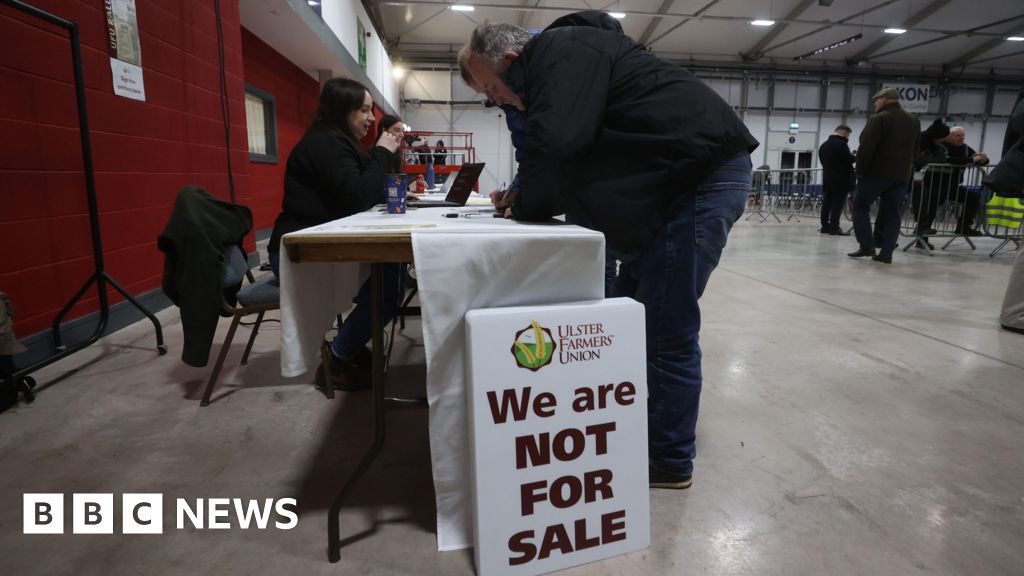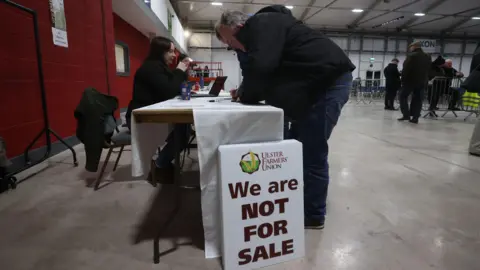 PA Media
PA MediaQueues of traffic have formed round the Eikon Centre in Lisburn, where farmers are gathering at a rally to protest against changes to inheritance tax.
The event, organised by the Ulster Farmers’ Union, is also being attended by politicians as well as agricultural leaders.
Farmers say the cap of £1m on agricultural property relief announced in the budget last month will see the next generation deterred from taking over family enterprises.
The rally has been called ahead of national protests in London on Tuesday.
Earlier, a cross-party letter signed by all of Northern Ireland’s MPs was sent to Chancellor Rachel Reeves.
The letter called on her to reconsider her plans to change agricultural property relief (APR) which reduces the amount paid when farmland is passed to the next generation.
Farmer Martin Cunningham, who is among those set to be affected, spoke to BBC News NI.
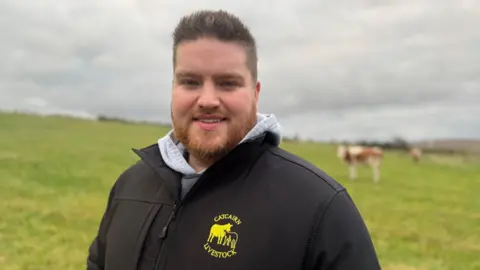
Martin has always dreamed of taking on his family’s farm in the Belfast Hills and building on what his great-grandfather started.
But he says the Budget announcement ending APR on inheritance tax has ended that.
“If this farm’s handed down to me, I’ll have an incredible tax bill to pay,” Mr Cunningham said.
“I’ll have to sell land in order to pay that, I’m going to have to sell land over the value of £200,000,” he said.
“It’s not simple to sell land up here, it’s either all or nothing.”
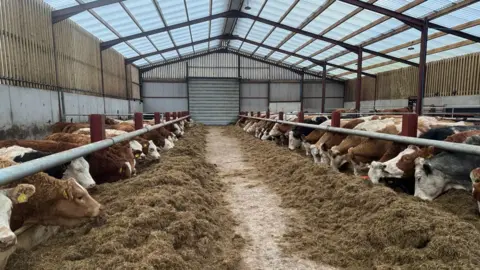
How is inheritance tax changing?
Since 1984, APR has allowed land used for crops or raising animals, as well as farm buildings, cottages and houses, to be exempt from inheritance tax.
From April 2026, it will only apply to the first £1m of the estate, with anything over that value taxed at 20% – half the usual rate.
Research by the Department of Agriculture, Environment and Rural Affairs suggests a third of farmers in Northern Ireland will be affected, with the dairy sector particularly badly hit.
The average farm in Northern Ireland is about 100 acres and land values have risen in recent years.
For Mr Cunningham, this means the value of his family’s almost-200 acres alone puts the farm over the £1m tax-free bracket.
That’s before any equipment, farm buildings and house are taken into account.
The prospect of a six-figure bill has him worried.
“I don’t know how we could ever raise that money,” Mr Cunningham said.
“I currently have a full-time job, and my dad farms here himself,” he said.
“I don’t know how we could afford to pay a tax bill, pay off our debt and continue to farm. It just doesn’t make sense anymore.”
Mr Cunningham says like many farmers, his family have constantly invested in the farm.
“We have been crippled with debt this last few years, increasing our cattle numbers, increasing our land, improving our land and building new buildings, it’s been a real big bill for us to get over,” he said.
“So while we’re still in debt, we’ve been adding to the value, and therefore now it seems that we have given ourselves a tax bill.”
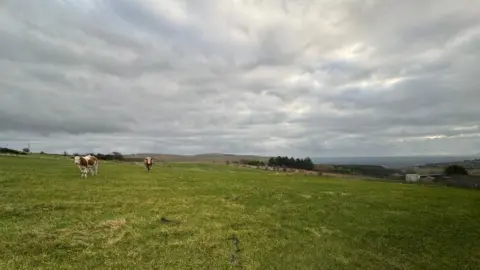
Impact on farming community
Speaking to BBC Radio Foyle’s North West Today programme on Monday, farmer Ian Buchannan said he believes changes to inheritance tax will be “the final straw that has broken the camel’s back” for many farmers.
Mr Buchannan, who has a farm outside Dungiven, County Londonderry, said he, like many other farmers, are very concerned over what this will mean for the future of farming in Northern Ireland.
“The return we get on an investment on a farm, say it is worth one million or two million pounds, whatever the farm value is, it is well known that the return on that is 0.5% net profit per year – which is peanuts,” he said.
“60%-80% of all farm income over the last 10 years in Northern Ireland comes from subsidies.”
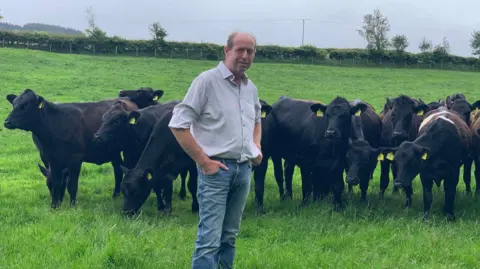
“Farms are like parcels that are passed down; you don’t open it but you just pass it on – farms are not generally sold unless a [family] line dies out,” Mr Buchannan said.
“This is incredibly tough for a lot of farmers and I do feel there is a lot of mental stress within the community.”
Rally in London
Farmers from across the UK are preparing for a rally in London on Tuesday, calling on the Chancellor Rachel Reeves to reverse the changes.
But the Treasury has rejected proposals that would soften the impact.
Mr Cunningham is sad and angry.
“I have a passion for farming. It’s all I know. It’s all I want to know,” he said.
“Feeding the country is what we’re all about to the highest standard in the world, and it’s going to finish in one generation.”
